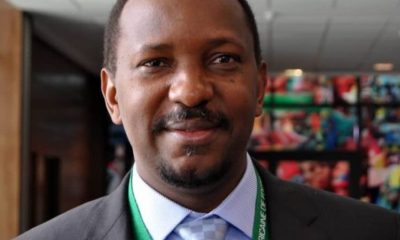NATIONAL NEWS
Obi Raises Alarm Over Nigeria’s Soaring Debt, Accuses Government Of Reckless Borrowing

Peter Obi, the Labour Party’s presidential candidate in the 2023 general election, has once again voiced strong concerns about Nigeria’s escalating debt profile under the current administration, accusing the government of “reckless borrowing” without adequate accountability.
His remarks follow the recent approval by the Nigerian Senate of additional external borrowing totalling $21 billion, €2.2 billion, and ¥15 billion for the 2025–2026 fiscal cycle.
The latest loan approval pushes Nigeria’s total debt to an alarming N187 trillion. He expressed fears that the nation’s debt burden could surpass N200 trillion before the end of the year.
Obi took to his X (formerly Twitter) handle to express his concerns, providing a detailed breakdown of the country’s financial situation.
“With an already existing public debt of approximately N149.39 trillion as of the first quarter of 2025, the approved loans of roughly N37.2 trillion bring our current total debt to about N187 trillion,” he stated. “Concerns remain that our debt might likely exceed N200 trillion by the end of 2025.”
The former Governor of Anambra State highlighted the alarming debt-to-GDP ratio, emphasising the unsustainability of the current trend.
“Before rebasing, our GDP was about N269.2 trillion (approximately $180 billion); thus, the government has borrowed the equivalent of nearly 70% of our previous GDP,” Obi pointed out. “Even after the rebasing, which pushed our GDP to about N372.8 trillion (approximately $243.7 billion), the government will have borrowed about 50.16% of the new GDP (with the approved loans), representing the highest debt-to-GDP ratio in our nation’s history.”
Obi argued that the massive borrowing has not translated into tangible improvements in key sectors of the economy. He lamented the underfunding of education, the inaccessibility of healthcare for millions, and the deteriorating security situation.
“While the year-on-year increase is about N27.72 trillion and the quarter-on-quarter increase is about N4.72 trillion, we are accumulating exponentially unsustainable debt with little to show for it in critical areas such as education, healthcare, electricity generation, security of lives and property, and poverty reduction,” he said.
He cited statistics on the security situation, stating that over 10,217 people had been killed and 672 villages sacked between May 29, 2023, and May 29, 2025, despite a significant increase in security spending. He also highlighted the deplorable state of infrastructure, with many of the country’s roads remaining unpaved and unusable.
Obi further drew attention to the worsening poverty situation in the country. “Today, more than two years after the present government took over, and with all the humongous borrowing, we are still confronted with negative reports of worsening poverty, with approximately 133 million (63%) Nigerians classified as multi-dimensionally poor, increasing unemployment, and disheartening news such as the deaths of 652 children as the malnutrition crisis worsens in Northern Nigeria,” he stated.
He referenced the recent alarm raised by Médecins Sans Frontières (MSF) regarding the escalating malnutrition crisis in Northern Nigeria, with Katsina State being particularly affected.
While acknowledging that borrowing can be beneficial if sustainable and linked to productive investments, Obi criticised the current administration’s approach.
“Borrowing is not inherently bad if it is sustainable and tied to productive investments with measurable outcomes. Unfortunately, this current pattern of borrowing without accountability, transparency, and transformational impact is simply mortgaging the future of our children,” he warned.
He urged the government to consider the long-term consequences of its borrowing practices and prioritise the well-being of future generations. “The government should consider the intergenerational consequences of their unsustainable borrowings and demonstrate at least a minimum consideration and interest in the future of young and unborn Nigerians,” he appealed.
Obi called for a return to fiscal discipline, prudent economic management, and a reduction in the cost of governance.
“We must return to a disciplined and prudent economic management culture, cutting the cost of governance, blocking leakages, investing in human capital, and building a productive economy,” he asserted. “Nigeria cannot continue to borrow recklessly while poverty deepens and public trust erodes.”
He reiterated his commitment to building a “New Nigeria” characterised by responsible leadership, people-centred development, and accountable use of public funds.
“It is time to stop this fiscal indiscipline. We must build a New Nigeria, where leadership is responsible, development is people-centred, and every kobo borrowed or spent delivers a measurable impact to achieve sustainable and inclusive development and growth,” he said, adding his campaign slogan, “A new Nigeria is POssible.”
Reactions to Obi’s statement have been varied. Supporters have lauded his continued scrutiny of the government’s economic policies, while critics have accused him of playing politics.
The debate surrounding Nigeria’s growing debt burden is expected to continue to fuel public discourse in the coming months.
-
CRIME4 years ago
PSC Dismisses DCP Abba Kyari, To Be Prosecuted Over Alleged $1.1m Fraud
-
FEATURED4 years ago
2022 Will Brighten Possibility Of Osinbajo Presidency, Says TPP
-
FEATURED2 years ago
Buhari’s Ministers, CEOs Should Be Held Accountable Along With Emefiele, Says Timi Frank
-
BUSINESS & ECONOMY2 years ago
Oyedemi Reigns As 2023’s Real Estate Humanitarian Of The Year
-
SPORTS2 years ago
BREAKING: Jürgen Klopp Quits Liverpool As Manager At End Of Season
-
SPORTS2 years ago
Could Liverpool Afford Kylian Mbappe For €200 million? Wages, Transfer Fee
-
ENTERTAINMENT2 years ago
Veteran Nigerian Musician, Basil Akalonu Dies At 72
-
FEATURED2 years ago
Tribunal Judgement: Peter Obi Warns Of Vanishing Electoral Jurisprudence, Heads To Supreme Court
-
BUSINESS & ECONOMY2 years ago
Oyedemi Bags ‘Next Bulls Award’ As BusinessDay Celebrates Top 25 CEOs/ Business Leaders
-
FEATURED4 years ago
2023 Presidency: South East PDP Aspirants Unite, Demand Party Ticket For Zone



































